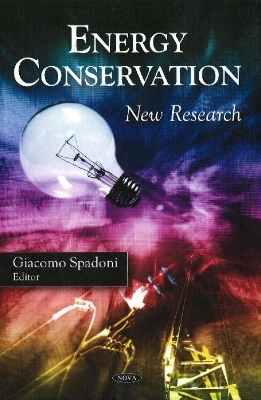
Energy Conservation
New Research
Seiten
2009
Nova Science Publishers Inc (Verlag)
978-1-60692-231-6 (ISBN)
Nova Science Publishers Inc (Verlag)
978-1-60692-231-6 (ISBN)
Energy conservation may result in increase of financial capital, environmental value, national security, personal security, and human comfort. This important element of energy policy reduces energy consumption and energy demand per capita. This book concentrates on energy conservation which is the practice of decreasing quantity of energy used.
This book concentrates on energy conservation which is the practice of decreasing the quantity of energy used. It may be achieved through efficient energy use, in which case energy use is decreased while achieving a similar outcome, or by reduced consumption of energy services. Energy conservation may result in increase of financial capital, environmental value, national security, personal security, and human comfort. Individuals and organisations that are direct consumers of energy may want to conserve energy in order to reduce energy costs and promote economic security. Industrial and commercial users may want to increase efficiency and thus maximise profit. Energy conservation is an important element of energy policy. Energy conservation reduces the energy consumption and energy demand per capita, and thus offsets the growth in energy supply needed to keep up with population growth. This reduces the rise in energy costs, and can reduce the need for new power plants, and energy imports. The reduced energy demand can provide more flexibility in choosing the most preferred methods of energy production. By reducing emissions, energy conservation is an important part of lessening climate change. Energy conservation facilitates the replacement of non-renewable resources with renewable energy. Energy conservation is often the most economical solution to energy shortages, and is a more environmentally benign alternative to increased energy production.
This book concentrates on energy conservation which is the practice of decreasing the quantity of energy used. It may be achieved through efficient energy use, in which case energy use is decreased while achieving a similar outcome, or by reduced consumption of energy services. Energy conservation may result in increase of financial capital, environmental value, national security, personal security, and human comfort. Individuals and organisations that are direct consumers of energy may want to conserve energy in order to reduce energy costs and promote economic security. Industrial and commercial users may want to increase efficiency and thus maximise profit. Energy conservation is an important element of energy policy. Energy conservation reduces the energy consumption and energy demand per capita, and thus offsets the growth in energy supply needed to keep up with population growth. This reduces the rise in energy costs, and can reduce the need for new power plants, and energy imports. The reduced energy demand can provide more flexibility in choosing the most preferred methods of energy production. By reducing emissions, energy conservation is an important part of lessening climate change. Energy conservation facilitates the replacement of non-renewable resources with renewable energy. Energy conservation is often the most economical solution to energy shortages, and is a more environmentally benign alternative to increased energy production.
Preface; On Energy Conservation in Infinite Systems; Numerical Analysis of Double Diffusive Natural Convection in Trapezoidal Enclosure Filled with Porous Medium Under a Magnetic Field; Identifying Energy Conservation Behaviours of 6,7,and 8th Grade Elementary School Children: A Pilot Study With Turkish Children; Energy Conservation Measures as Investments; Towards Sustainable Energy Consumption Patterns: Economic Modeling of Energy Conservation in Greece; Energy Indeterminacies and Inequalities During Tunneling; Energy Conservation in Hawking Radiation as Tunneling; Spray Combustion Simulation for Low-NOx Emissions; Mass and Energy Conserving Fully Discrete Schemes for the Shallow-water Equations; Energy Conservation in Nanoelectronics.
| Zusatzinfo | Illustrations, unspecified |
|---|---|
| Verlagsort | New York |
| Sprache | englisch |
| Maße | 260 x 180 mm |
| Gewicht | 776 g |
| Themenwelt | Technik ► Elektrotechnik / Energietechnik |
| ISBN-10 | 1-60692-231-9 / 1606922319 |
| ISBN-13 | 978-1-60692-231-6 / 9781606922316 |
| Zustand | Neuware |
| Haben Sie eine Frage zum Produkt? |
Mehr entdecken
aus dem Bereich
aus dem Bereich
Kolbenmaschinen - Strömungsmaschinen - Kraftwerke
Buch | Hardcover (2023)
Hanser (Verlag)
49,99 €


